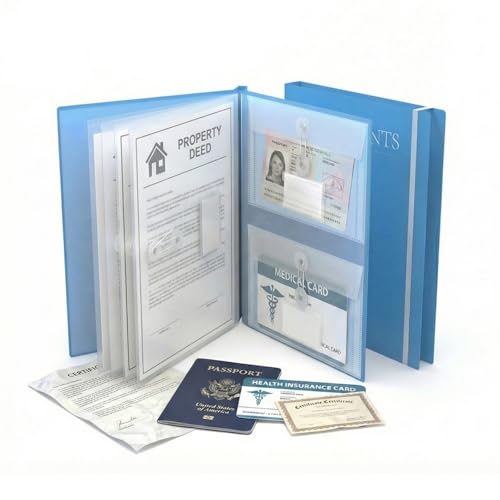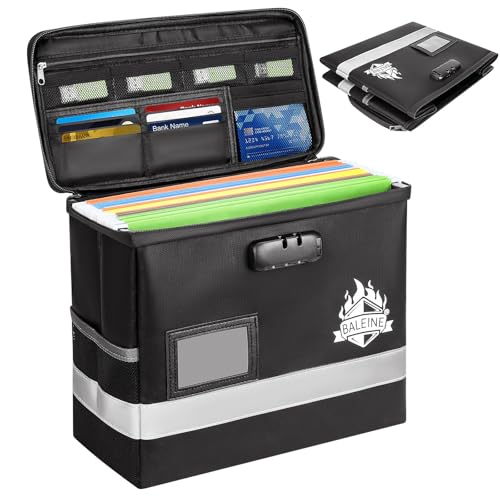To organize your insurance policies and claims, start by creating a dedicated filing system, either digital or physical, labeled clearly for easy access. Track renewal dates with calendar alerts or apps and keep copies of all documents, receipts, and reports in one place. Review your policies regularly to stay informed of coverage changes. Staying organized helps you quickly find what you need and prevents delays. Keep exploring to learn more tips for maintaining smooth insurance management.
Key Takeaways
- Create a dedicated filing system for policies and claim documents, both physical and digital.
- Track renewal dates and claim deadlines using calendar alerts or specialized apps.
- Gather and organize all relevant documents, including receipts, reports, and correspondence, for each claim.
- Review policy details regularly to stay informed about coverage, premiums, and renewal requirements.
- Ensure all claim forms are accurately completed and fully supported with organized documentation.

Handling insurance paperwork can feel overwhelming, but understanding what’s required makes the process much easier. When it comes to managing your policies and filing claims, staying organized is key. One of the most common tasks is keeping track of policy renewal dates. Policies typically have expiration dates, and missing a renewal can leave you without coverage when you need it most. To avoid lapses, set reminders a few weeks before your policy’s renewal date. Review your policy details carefully, noting any changes in coverage, premiums, or deductibles. When renewal time arrives, you might need to provide updated information or sign new documents. Ensuring your records are current and complete helps prevent delays or denied renewals. Vetted information about your insurance coverage can also help you make informed decisions.
Stay organized by tracking renewal dates and reviewing policy details to ensure continuous coverage and avoid lapses.
Claim documentation is another critical aspect of insurance paperwork. Whenever you experience an incident—like a car accident, a property damage, or a health issue—you must gather all relevant documents to support your claim. This includes photos of the damage, police reports, medical records, receipts, and repair estimates. The more organized and extensive your claim documentation, the smoother the claims process will be. Keep copies of everything in a dedicated folder, whether physical or digital, so you can access them quickly if needed. When submitting your claim, double-check that all required forms are filled out accurately and include your claim documentation. Incomplete or disorganized submissions can cause delays or even denial of your claim.
To stay on top of your insurance paperwork, consider creating a system for tracking renewal dates and claim submissions. Use calendar alerts or dedicated apps to remind you of upcoming policy renewals. For claim documentation, develop a file system where you store all related paperwork by date or claim type. This way, when an incident occurs, you’re not scrambling to find essential documents. Additionally, regularly review your insurance policies to understand what documentation is required for claims or renewals. This proactive approach helps you avoid surprises and ensures you’re always prepared.
Ultimately, managing insurance paperwork isn’t just about filing documents; it’s about maintaining an organized system that supports your coverage needs. Staying on top of policy renewal deadlines and having your claim documentation ready speeds up the process and reduces stress. By being proactive and organized, you’ll find that handling insurance paperwork becomes less intimidating and more manageable, giving you peace of mind knowing you’re protected and prepared when it counts.

Important Document Organizer, Folders for Documents, Family File Folder Organizer with Elastic Band, Binder Organizer for Paper, Certificates, Passports, Photos, 1 pc
All-in-One Document Control: End the paper chase. Our versatile document binder acts as a central command hub, consolidating…
As an affiliate, we earn on qualifying purchases.
As an affiliate, we earn on qualifying purchases.
Frequently Asked Questions
How Often Should I Review My Insurance Policies?
You should review your insurance policies at least once a year to confirm proper document organization and stay updated on policy changes. Life events like buying a home, having a baby, or a job change also warrant a review. Regularly checking for policy updates helps you identify gaps in coverage, understand new terms, and make necessary adjustments. Staying proactive keeps your coverage aligned with your current needs.
What Should I Do if I Lose My Insurance Paperwork?
Losing your insurance paperwork can feel like losing your lifeline, but don’t panic. First, contact your insurance provider to request copies of your policy documents and claim documentation. Keep these in a safe, easily accessible spot. When it’s time for policy renewal, having your paperwork ready speeds things up. Make it a habit to store important documents digitally or in a secure physical location to prevent future mishaps.
Are Digital Copies of Policies Legally Valid?
Digital copies of policies are generally legally valid if they include digital signatures and are stored securely online. Make certain your online storage is reputable and protected with strong passwords. Digital signatures help verify authenticity, making electronic documents equivalent to paper versions in court. Always keep backups and guarantee your insurance provider accepts digital documents, which most now do, simplifying access and saving you from losing important paperwork.
How Can I Ensure My Claims Are Processed Quickly?
To guarantee your claims process quickly, provide complete and accurate claim documentation upfront, as 80% of delays stem from missing info. Follow filing procedures carefully, including submitting claims promptly and keeping copies of all documents. Stay organized by tracking your claim status and communicating regularly with your insurer. This proactive approach minimizes delays and speeds up the resolution, making your insurance experience smoother and more efficient.
What Common Mistakes Should I Avoid When Organizing Policies?
You should avoid common mistakes like neglecting to update your policy renewal date, which can cause lapses. Keep claim documentation organized and easily accessible to prevent delays. Don’t forget to review policy renewal terms carefully to catch any changes. Failing to verify coverage details or misplacing important documents can slow down claim processing. Staying proactive and maintaining a well-organized system helps guarantee your policies stay current and claims are processed smoothly.
digital insurance policy management app
As an affiliate, we earn on qualifying purchases.
As an affiliate, we earn on qualifying purchases.
Conclusion
Staying organized with your insurance paperwork can save you time and stress when you need it most. Did you know that 60% of people lose important insurance documents, causing delays in claims? By keeping your policies and claims in order, you guarantee quick access and smoother processes. Take a few minutes today to tidy up your files—trust me, you’ll thank yourself later when an unexpected incident occurs. Stay organized and be prepared!

BALEINE Fireproof Document Box with Lock, Portable Fireproof Document Bag Waterproof Fire Proof File Boxes for Documents, File Organizer Box for Important Paperwork (Black, 12.5''x10.5''x6'')
Fireproof and Waterproof: The fireproof document box /bag is made of dust-proof silicone fiberglass, offering fire resistance up…
As an affiliate, we earn on qualifying purchases.
As an affiliate, we earn on qualifying purchases.

Car Insurance Reminder – Free Renewal Reminder
Car Insurance Reminder – for reminding you when your car insurance is about to expire
As an affiliate, we earn on qualifying purchases.
As an affiliate, we earn on qualifying purchases.









